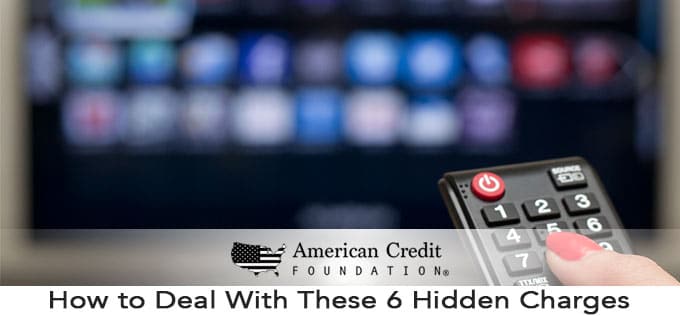
Ugh, hidden fees! They crop up everywhere and are seemingly unavoidable. Some of these charges are so sneaky that you might not have noticed them. Or they’re so small that you only realize they exist after they’ve added up over time.
Let’s investigate some of the more common fees that creep into our lives – and the ways to get around them.
Mailed Statements: Many financial institutions have gone paperless. This is both an ecological and economical decision: There’s less paper waste, and it costs less to deliver the documents electronically. To encourage acceptance, many banks now charge a fee to continue receiving your monthly statements in the mail. The good news is that it’s easy to switch to e-statements (usually a quick online sign-up), and you’ll stop being assessed this fee right away.
Foreign Transactions: If you spend much time (or money) abroad, you’re sure to have noticed that credit cards are widely accepted in other countries – but they typically come with an added fee. Credit card companies assess a foreign transaction fee, which is typically 1% to 3% on top of your purchase price. You can avoid the fee by simply paying cash or by applying for a card from one of the few credit card companies that waive this fee.
Car Rentals: Rental car companies sometimes impose a surcharge for certain locations like airports and other high-volume or high-convenience settings. Do your research: You can often avoid this surcharge (and find better deals) just by choosing an off-site property at nearby lots. Many times, the big-name rental companies have alternative locations just a short cab ride away.
Entertainment Services: Many monthly service providers – from cable to satellite TV and radio to internet – entice new subscribers by offering a sweet promotional rate for the first 6 or 12 months. After that introductory period, however, the monthly rates rise steeply. When you sign up, create a calendar reminder to contact your provider before your introductory period ends. Calling the company to negotiate the same rate a few days before it expires – and/or being prepared to potentially switch to a different provider – could convince them to keep the cost low.
ATM Fees: Every time you access cash from an ATM out of your network, you face a service charge. In some places, this is more than $4 per transaction. Avoid this highway robbery by sticking to cash machines that are associated with your bank. Of course, when you’re in a jam, there’s really no way around this fee. But check if your bank has an app that lets you search for in-network ATMs in your vicinity, and if your current institution doesn’t have convenient fee-free machines, consider moving to a different bank that doesn’t have out-of-network fees.

Closing Costs: When buying a home, you’ll sign an inordinate number of forms and pay an excessive number of fees. From inspection fees to title search fees to survey fees to loan origination fees, the process can feel overwhelming. Although many of these fees feel downright frivolous, the bad news is that most are unavoidable for one reason or another. But they might be negotiable – sometimes you can get the amounts lowered, while other times you might be able to arrange for the seller to pay part or all of the closing costs.
These are only a handful of the hidden fees we encounter regularly. But we’re here to help you uncover other ways to save your hard-earned money. If you face other fees that seem superfluous or suspect, don’t hesitate to reach out to American Credit Foundation. You’ll speak with one of our friendly team members, who will evaluate your expenses and discuss potential ways to trim the fat off your charges.